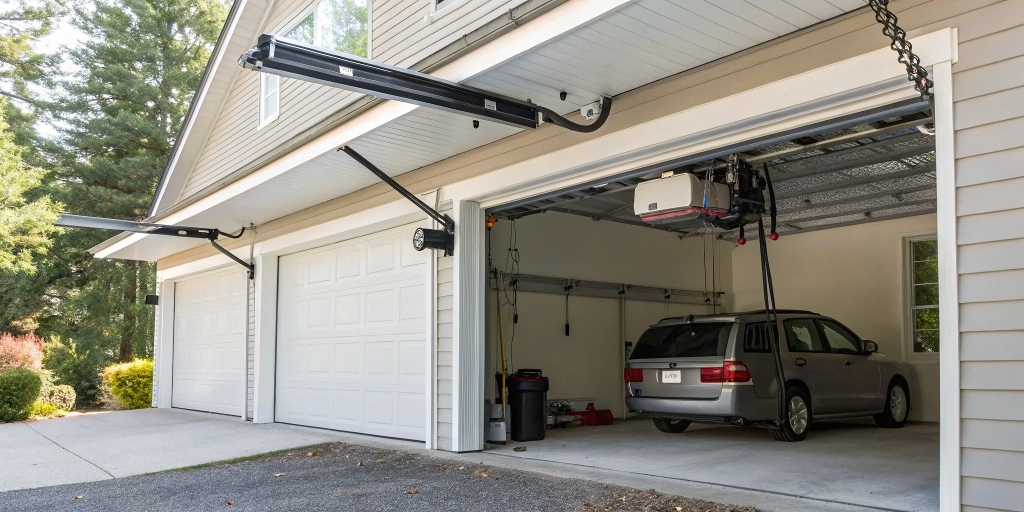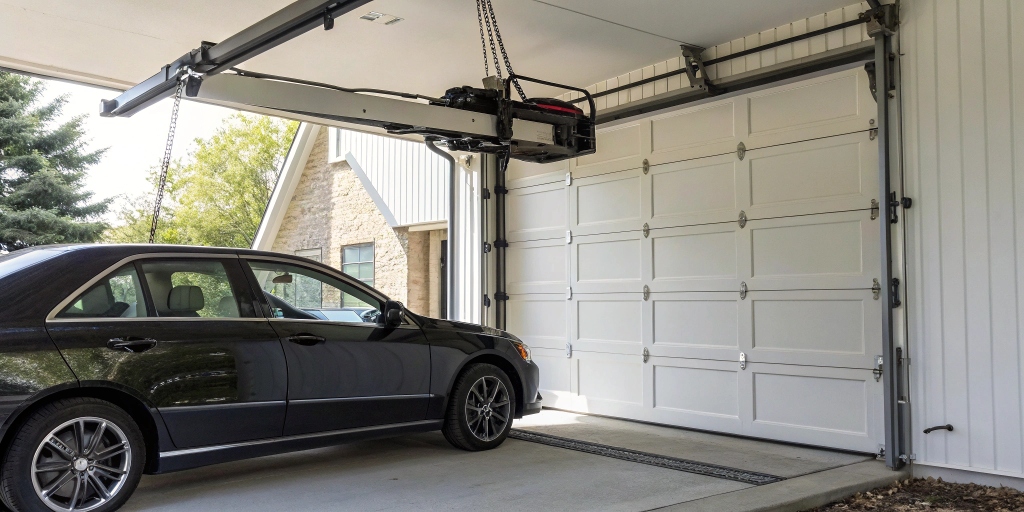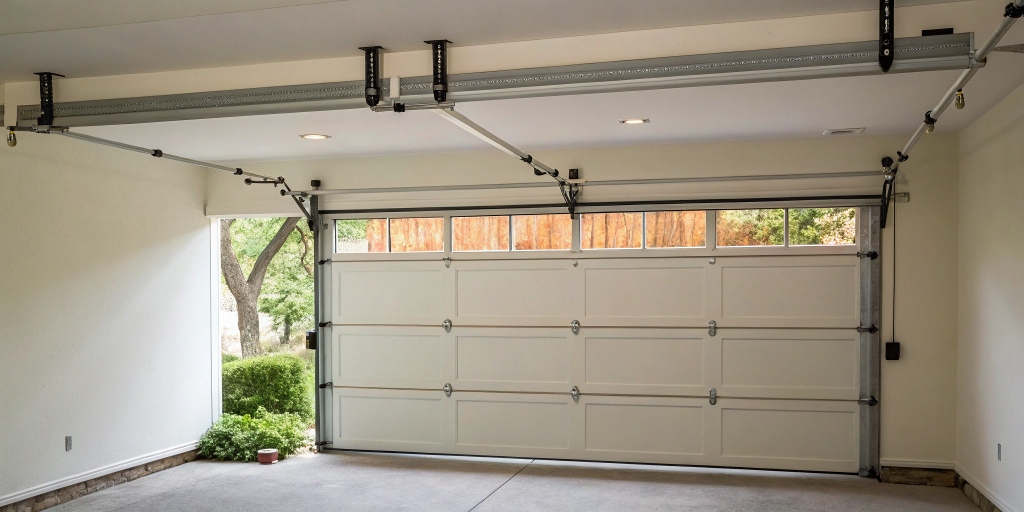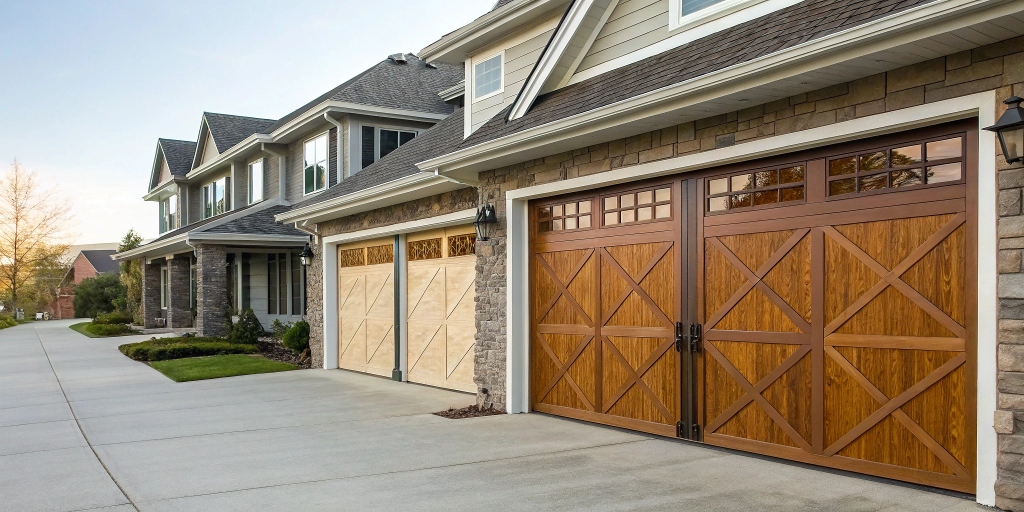Imagine coming home after a long day, pressing your garage door remote, and hearing that dreaded grinding noise—or worse, nothing at all. Is your garage door too heavy for the opener? Or is it just a matter of mismatched horsepower? If you’ve ever wondered “how much horsepower for a garage door opener” or debated between a 1/2 HP vs a 3/4 HP garage door opener, you’re not alone. Garage doors can weigh anywhere from 100 to over 500 pounds, and choosing the right opener isn’t just about power—it’s about safety, efficiency, and longevity. In this comprehensive guide, we’ll break down everything you need to know about garage door opener horsepower, weight-lifting capacity, and how to size the perfect system for your home. Whether you’re installing a new 1 HP garage door opener or troubleshooting an existing setup, we’ve got the insights to help you make an informed decision.
Understanding Garage Door Opener Horsepower: The Basics
Horsepower (HP) is a unit of power that measures how much work an engine or motor can do over time. In the context of garage doors, it’s all about the motor’s ability to lift and lower the door smoothly. But here’s the key: a garage door opener isn’t designed to bear the full brunt of your door’s weight. Instead, it works in tandem with torsion or extension springs that counterbalance most of the load—typically 90-95% of it. This means even a modest 1/3 horsepower garage door opener can handle everyday operations if the system is well-maintained.
To put it in numbers, horsepower is defined as the power needed to lift 550 pounds one foot in one second. For garage door openers, which typically move at about 8 inches per second, we adjust this with a 2/3 factor for real-world calculations. For example:
- A 1/2 HP motor theoretically lifts around 184 pounds.
- A 3/4 HP motor bumps that up to about 276 pounds.
- A full 1-horsepower garage door opener could handle up to 367 pounds in peak conditions.
However, these are theoretical peaks. Actual performance is lower due to built-in safety features like auto-reverse mechanisms and force shutoffs, which prevent damage or injury. In practice, a 1/2 HP garage door opener might safely lift 125 pounds, while a 3/4 HP version could manage 175 pounds. Newer models often lift even less to prioritize safety, ensuring they stop if they encounter excessive resistance.
This distinction is crucial when answering questions like “what HP for garage door opener” or “how much HP for garage door opener.” It’s not just about raw power; it’s about matching the opener to your door’s specifications, including size, material, and balance.
Factors Influencing Garage Door Weight and Opener Needs
Before diving into specific HP recommendations, let’s talk about what makes a garage door heavy in the first place. A standard single-car steel door might weigh 100-150 pounds, while a double-car wooden door could tip the scales at 300-500 pounds or more. Factors like insulation, material (steel, wood, aluminum), and size play a big role. For instance, a 2-car garage door weight often ranges from 200-400 pounds, depending on whether it’s insulated or has windows.
To calculate your garage door weight accurately, consider using a door weight calculator auto tool or consulting a professional. You can also perform a simple test: Disconnect the opener and lift the door manually. If it requires more than 15 pounds of force for a single-car door or 25 pounds for a double, your springs need adjustment. This test directly ties into sizing garage door opener needs, as an unbalanced door forces the motor to work harder, potentially leading to premature failure.
Climate is another overlooked factor. In colder regions, ice and snow can add temporary weight or cause sticking, making a higher HP, like a 3/4 HP Liftmaster garage door opener, a smarter choice. Conversely, in humid summers, expanded seals might cause friction, mimicking extra weight. Regular maintenance, such as lubricating tracks and checking springs, can mitigate these issues and extend the life of your setup.
Comparing Horsepower Ratings: 1/2 HP vs 3/4 HP Garage Door Opener and Beyond
One of the most common debates is “1/2 HP vs 3/4 HP garage door opener”—which one do you really need? Let’s break it down with real-world comparisons.
- 1/3 HP Garage Door Opener: Ideal for lightweight doors under 125 pounds, like basic single-car models. These are budget-friendly but less common now, as manufacturers like Chamberlain and Liftmaster have phased them out. If your door is light and well-balanced, this could suffice, but it’s not recommended for heavier or frequently used doors.
- 1/2 HP Garage Door Opener: The gold standard for most homes. It handles doors up to 300 pounds, making it perfect for standard residential setups. Models like the Liftmaster 8365W (chain drive) or 8355W (belt drive) offer reliable performance. Pros: Affordable, energy-efficient, and sufficient for average use. Cons: May struggle with very heavy or unbalanced doors. If you’re comparing a 1/2 HP garage door opener vs a 3/4 HP, the former is often enough unless you have extras like insulation adding weight.
- 3/4 HP Garage Door Opener: Steps up for doors up to 500 pounds, providing more torque for smoother operation on larger or heavier doors. Think Liftmaster 8587W (chain drive) or 8550W (belt drive). It’s a great middle ground for homes with wooden doors or in extreme weather. In a 3/4 HP vs 1/2 HP garage door opener matchup, the 3/4 wins for longevity in demanding conditions, but it might be overkill for lighter doors, potentially masking underlying balance issues.
- 1 HP Garage Door Opener: For heavy-duty needs, lifting to 650 pounds. Chain drive options like the 1 HP chain drive garage door opener or jackshaft models (wall-mounted for space-saving) excel here. Brands offer 1 HP garage door openers for commercial-style residential doors or high-lift setups. However, questions like “Is a 1 1/4 HP garage door opener too much?” often arise—yes, for most homes, as it can lead to unnecessary strain if not matched properly.
- 1 1/4 HP Garage Door Opener: Rare in residential use but available for oversized or commercial doors. It’s overpowered for standard garages, where a 3/4 HP or 1 HP suffices.
When comparing a 3/4 HP vs a 1 1/4 HP garage door opener, consider your door’s specifics. A garage door opener size chart can help: Match HP to maximum door weight, assuming proper maintenance. For example, a 3/4 HP Genie garage door opener might be ideal for mid-range needs, while a 1/2 HP vs 1 1/4 HP garage door opener comparison shows the latter is better for extreme cases.
Don’t forget opener types: Chain drives are durable and affordable (e.g., 3/4 chain garage door opener), belt drives are quieter, and jackshafts are space-efficient. DC motors, often rated in “horsepower similar” (HPS), provide comparable power to AC models but run smoothly.
Common Misconceptions and Tips for Optimal Performance
A big myth is that more horsepower always means better performance. In reality, a higher HP, like a 1 1/4 garage door opener, might compensate for poor maintenance but won’t fix root issues like broken springs. Always prioritize balance—your opener should exert minimal force.
Another misconception: Openers can run indefinitely with broken springs. While possible in emergencies, it risks stripping gears or damaging the motor. Test safety features regularly, like placing a 2×4 under the door to check auto-reverse.
Tips for sizing:
- Measure your garage door horsepower needs by weighing the door (use a scale or professional service).
- Opt for annual tune-ups to keep everything aligned.
- For wood doors, consult a wood garage door weight chart, as they can be denser.
- If upgrading, consider smart features in models like the Liftmaster Professional 1/2 HP for added convenience.
Addressing “how many HP garage door opener” or “what horsepower garage door opener do I need”: Start with 1/2 HP and scale up based on weight and usage. For instance, a 3/4 HP electric motor in an opener provides that extra buffer without excess.
Answering Your Top Questions on Garage Door Opener Power
- How much does a garage door weigh? Single-car: 100-200 lbs; double-car: 200-500 lbs. Insulated models add 50-100 lbs.
- Garage door opener: how much horsepower? Depends on door weight—1/2 HP for most, up to 1 HP for heavy ones.
- How much power does a garage door opener use? Typically 300-500 watts, similar to a light bulb, but varies by model.
- What HP garage door opener do I need? Test your door’s lift force; if under 25 lbs, 1/2 HP works.
- 1/2 vs 3/4 HP garage door opener? Go 3/4 for heavier doors or frequent use.
- How many foot-pounds to lift a car? Not directly related, but garage openers focus on door torque, not vehicle lifting.
For specialized needs, like a power lift garage door opener or motorized garage, consult local experts.
Conclusion: Power Up Your Garage with Confidence
Choosing the right garage door opener horsepower isn’t rocket science—it’s about understanding your door’s weight, balance, and environment. Whether you’re eyeing a 1 HP chain drive garage door opener for robustness or a quiet 3/4 HP belt model, remember that proper installation and maintenance are key to avoiding issues. By now, you should have a clear answer to “how much horsepower garage door opener” and feel equipped to upgrade or troubleshoot.
Ready to find the perfect fit? Visit our shop for top-rated models like the Liftmaster 1/2 horsepower or Chamberlain options, or contact our team for a free consultation. Don’t let an underpowered opener ruin your day—act now and ensure smooth, reliable access to your garage!
Find out more:
What is the Most Used Tool in the Garage?
Car Door Seal Water Leak Prevention





